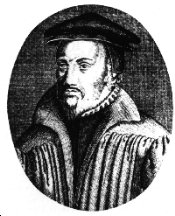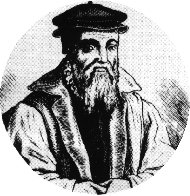

1536 – 1587 1534 – 1583
The two young men (only 26 and 28 years old respectively) couldn’t have guessed that their Heidelberg Catechism, designed for teenagers, would find adult readers annually buying more than 100,000 books that discuss the crown jewel of the shorter Reformation writings. Written in German, within 25 years it would be translated into Dutch, Latin, Hebrew, Greek, French, Italian, Polish, English, Lithuanian, Czech and Rumanian. At present it can be read in 30 languages. Plainly the Catechism is cherished inasmuch as it continues to fortify Christians who find themselves beleaguered in any way for any reason.
Four hundred and fifty-three years after its publication (1563), Christ’s persecuted still find in it the substance their head requires and the stiffening their heart craves if they are going to stand firm in their struggle against all principalities and powers. Designed to be memorized, the Catechism has readily sunk to the bottom of the minds of young people only to effervesce years later when the assaults and seductions of adult life are threatening to bend them and break them. “What is your only comfort in life and in death?”, Question #1 asks without apology. Then it provides an answer that millions have found not only fathomlessly profound but also endlessly moving: “My only comfort is that I am not my own but belong – body and soul, in life and in death – to my faithful Saviour Jesus Christ….”
The comfort spoken of here is more than the “warm fuzzy” of religious sentimentality. Con is Latin for “with”; fortis for “strength.” This “comfort” consoles only because it first strengthens Christ’s people in the face of pressures that will otherwise find them capitulating and collapsing.
The second question is similarly pithy and pertinent: “What must you know to live and die in the joy of this comfort?” Answer #2: “Three things: first, how great my sin and misery are; second, how I am set free of all my sins and misery; three, how I am to thank God for such deliverance.” The first section is the shortest and the second (the setting-forth of our salvation) is the longest, while the third section (Christian obedience or the life of discipleship) has the simple yet grand title, “Thankfulness.” In other words the whole of the Christian life is a response neither resented nor grudged but rather rendered freely, joyfully, spontaneously, thankfully.
Caspar Olevianus was born in the city of Treves on the border of Luxembourg. His father, Gerhard von der Olewig, headed the baker’s guild of the city. The family was well-to-do and could afford a fine education for its gifted son. Graduating from a Roman Catholic monastery school, Olevianus was haunted for years by the parting words of a godly priest: “My boy, never forget that God’s people in all ages have found their comfort in the atoning life and sacrifice of Jesus Christ.”
A age 14 Olevianus moved to Paris to study law. Startled at his brush with death when several drunken fellow-students drowned in a boating mishap, he allied himself with French Protestant students whose spiritual depth and searching friendship soon won him to the Reformation. Afire now with the gospel, he finished law school and began devouring the theology of the Reformers. His insatiable appetite took him to the classrooms of Peter Martyr in Zurich, Theodore Beza in Lausanne, and John Calvin in Geneva.
Upon returning to Treves, Olevianus forthrightly announced the gospel and denounced the “holy coat” of Joseph, together with similar superstitions that impeded Word-quickened faith. And just as quickly city authorities imprisoned him. A wealthy benefactor was allowed to ransom him on condition that he leave the city permanently. Heidelberg immediately welcomed him, installing him as pastor and principal of the university’s faculty of theology. In the spring of 1562 he, along with Ursinus, was asked to write a catechism instructing young people in the faith.
Zacharias Baer was born in Breslau (today a city in Poland.) Like all young humanist scholars of that era he gave himself a Latin name (ursus, “bear”; olevianus, “wrestling school”) in order to identify himself with the learning of antiquity. He enrolled at Wittenberg University, boarding for the next seven years with Melanchthon, Luther’s erudite successor. Melanchthon admired the young man for his intellectual gifts and his spiritual maturity, commending him to mentors throughout Europe. Subsequently Ursinus too studied under Reformation giants at Strasbourg, Basel, Lausanne and Geneva. Sojourns in Lyons and Orleans gave him expertise in Hebrew. Returning to Breslau he published a pamphlet on the sacraments. Opponents’ vitriolic reaction succeeded in driving him out of the city. Eventually he was brought to Heidelberg as professor of theology.
Ursinus and Olevianus never disdained the work of their predecessors. For this reason they began writing their catechism only after they had researched all the instructional material they could procure. By 1563 they had fulfilled their commission, and two copies, in Latin and German, were sent to Heinrich Bullinger in Zurich, accompanied by the note, “It is obvious how much we owe to you and to the Swiss reformers. We have drawn not from one but from many sources. To God alone be glory.”
When political power changed hands in Heidelberg both men were expelled. Olevianus moved to Herborn where he gave himself to practical church reforms, visiting congregations, administering discipline, and ordering church life. Ursinus fled to Neustadt where his health soon broke and his wife, Margaretha Troutwein, nursed him as his life dribbled away. Neither man saw old age. Yet both will be remembered throughout Christendom for their 129 questions and answers. They were alike devout, brilliant, dedicated and diligent. Possessed of immense affection for students and parishioners, they were also relentlessly industrious, always “making most of the time” (Colossians 4:4) – as the motto above Ursinus’s desk indicated:
Friend, who comest here to stay,
Be brief, or go away I pray,
Or help me while I work today.
Victor Shepherd
September 1998